Why we granted anonymity to juror in article examining Starts Right Here shooting verdict
The Des Moines Register adheres to journalism standards that heavily discourage the use of anonymous sources. So why did we grant anonymity to a Polk County resident who served as a juror in the Preston Walls double-slaying trial?
An interview with that juror formed the basis of an article that describes the jury’s deliberations and decision-making process in acquitting Walls of first-degree murder in shooting two fellow students at the Starts Right Here alternative school in Des Moines and finding him guilty of lesser charges ― a verdict that many people found surprising.
Here’s the standard that Register journalists are obligated to uphold: “We will use confidential sources as the sole basis for published information only as a last resort and under specific procedures that best serve the public’s right to know.”

I believe strongly in the wisdom of that standard. Too often through the years, media outlets have published outright wrong or misleading information obtained through confidential sources who inadvertently or, worse, purposefully misrepresented the facts.
But Register editors believe the juror’s interview meets the two-part test specified in our confidential-source standard.
First, had we exhausted all avenues for obtaining this information from named sources, thus using a confidential source as the sole basis for our article “only as a last resort”? This juror voluntarily came forward to speak to the Register, but did so on the condition of remaining anonymous. The Register has no avenue to interview other jurors, unless they, too, would decide to come forward. Jurors were identified in court only by number, not by name.
And in connection with this trial, a juror would have valid reason to fear the consequences of being identified publicly. The prosecution focused much of its case on the contention that the shooting was part of an ongoing gang dispute that had led to numerous other shootings in Des Moines.
More: Juror in Starts Right Here school shooting trial: Prosecution didn't prove gang involvement
Court officials adopted additional security measures for the jurors who decided Walls’ fate. Besides being referred to in court only by number, the jurors were bused from their vehicles to the courthouse and were kept together and away from the public any time they were not in court.
In requesting anonymity, the juror cited these security measures, the allegations of gang activity and the high public interest surrounding the trial and asked that neither name nor gender be disclosed.
Second, does this article’s preparation and publication “best serve the public’s right to know”? Editors once again believe the answer is yes. The shooting deaths of Rashad Carr, 16, and Gionni Dameron, 18, at Starts Right Here, a program affiliated with the Des Moines Public Schools, shocked the community. In addition, the program’s founder, William Holmes, also known as Will Keeps, was injured in the shooting.
To casual observers, the case against Walls likely appeared open and shut. Indeed, his defense attorneys did not deny that he committed the shootings. They argued instead that the shootings were not premeditated and that Walls feared for his life.
The jury acquitted Walls of first-degree murder, criminal gang participation and attempted murder. It instead found him guilty of second-degree murder, voluntary manslaughter and assault.
The juror told courts reporter William Morris that motivation to contact the Register stemmed from a belief that the public didn’t understand the verdict.
The juror's account offers a glimpse into the processes and pressures involved as citizens perform the crucial civic duty of serving on a jury.
The juror described deliberations as emotionally wrenching as jurors considered a crime that left a trail of tragedy: Two teens dead. Keeps injured. Another teen now destined to likely spend decades in prison. Yet another young man, Bravon Tukes, goes on trial Monday, charged as the getaway driver.
Tempers flared as jurors passionately argued their points of view, the juror said; they believed in their verdict, but nonetheless shed tears in presenting it.
Editors believe that offering insight into the jury system as a whole, and specifically into how the jury viewed the evidence and reached its decision in this consequential case, squarely meets the definition of journalism that “best serves the public’s right to know.”
Carol Hunter is the Register’s executive editor. She wants to hear your questions, story ideas or concerns at 515-284-8545, chunter@registermedia.com, or on Twitter: @carolhunter.
This article originally appeared on Des Moines Register: Why we granted anonymity to juror to discuss school shooting verdict

